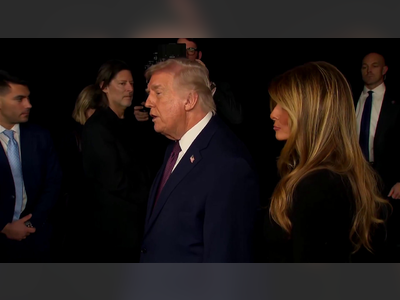Pentagon Issues Stark Warning Amid Escalating U.S.-Russia Tensions
The United States heightens its military rhetoric as the Russia-Ukraine conflict intensifies.
In an unprecedented move, the Pentagon has issued a warning regarding Russia, stirring international attention amid the ongoing Russia-Ukraine conflict.
The announcement came amid a series of significant geopolitical developments, including new statements from former U.S. President Donald Trump and escalating military actions in the conflict zone.
The Pentagon's ominous message coincides with a broader narrative of tension escalation in Eastern Europe, where the conflict between Russia and Ukraine continues to claim lives and provoke international responses.
Most recently, Russian forces conducted missile strikes in Zaporizhzhia, resulting in at least 13 fatalities, as confirmed by regional governor Ivan Fedorov.
Furthermore, reports have emerged of potential Russian military collaboration with North Korean forces, leading some to speculate on Moscow's deepening strategy in the region.
Meanwhile, fresh revelations by investigative journalists from The Insider and Der Spiegel have unveiled that Russia's military intelligence agency, the GRU, allegedly offered substantial bounties to the Taliban for targeting American soldiers in Afghanistan.
This development further underscores the complexities of Russia's foreign policy maneuvers and their potential repercussions on global security dynamics.
Donald Trump has entered the discourse by offering new comments on the conflict, aligning his views with an increasingly hawkish American sentiment towards Russian activities.
His statements continue to echo through political circles, adding another layer of complexity to U.S.-Russia relations.
On the diplomatic front, Ukrainian President Volodymyr Zelensky held meetings with numerous defense partners, including the German Minister of Defense Boris Pistorius, focusing on military aid and the possibility of enhancing air defense systems.
In conjunction with NATO and international allies, Ukraine is strategically consolidating its defenses amidst the ongoing crisis.
In a parallel development, the United States has announced its final tranche of military aid to Ukraine, totaling $500 million.
This package includes critical support for Ukraine's air defense capabilities, with provisions for new missile systems and fighter aircraft upgrades.
In a related financial maneuver, the British Ministry of Defence has secured a £45 million order for advanced drones as part of an international coalition supporting Ukraine's military efforts, reflecting the broader multinational commitment to Ukrainian sovereignty.
The European theater remains fraught with uncertainty as countries such as Slovakia, led by Prime Minister Robert Fico, consider imposing sanctions on Ukraine, citing economic pressures related to halted Russian gas supplies.
These developments reveal the intricate balance of energy dependency and political influence within the EU.
As the world keeps a close watch on these unfolding events, one thing remains clear: the geopolitical landscape is shifting, and the full implications of these developments will continue to emerge in the coming weeks.
The announcement came amid a series of significant geopolitical developments, including new statements from former U.S. President Donald Trump and escalating military actions in the conflict zone.
The Pentagon's ominous message coincides with a broader narrative of tension escalation in Eastern Europe, where the conflict between Russia and Ukraine continues to claim lives and provoke international responses.
Most recently, Russian forces conducted missile strikes in Zaporizhzhia, resulting in at least 13 fatalities, as confirmed by regional governor Ivan Fedorov.
Furthermore, reports have emerged of potential Russian military collaboration with North Korean forces, leading some to speculate on Moscow's deepening strategy in the region.
Meanwhile, fresh revelations by investigative journalists from The Insider and Der Spiegel have unveiled that Russia's military intelligence agency, the GRU, allegedly offered substantial bounties to the Taliban for targeting American soldiers in Afghanistan.
This development further underscores the complexities of Russia's foreign policy maneuvers and their potential repercussions on global security dynamics.
Donald Trump has entered the discourse by offering new comments on the conflict, aligning his views with an increasingly hawkish American sentiment towards Russian activities.
His statements continue to echo through political circles, adding another layer of complexity to U.S.-Russia relations.
On the diplomatic front, Ukrainian President Volodymyr Zelensky held meetings with numerous defense partners, including the German Minister of Defense Boris Pistorius, focusing on military aid and the possibility of enhancing air defense systems.
In conjunction with NATO and international allies, Ukraine is strategically consolidating its defenses amidst the ongoing crisis.
In a parallel development, the United States has announced its final tranche of military aid to Ukraine, totaling $500 million.
This package includes critical support for Ukraine's air defense capabilities, with provisions for new missile systems and fighter aircraft upgrades.
In a related financial maneuver, the British Ministry of Defence has secured a £45 million order for advanced drones as part of an international coalition supporting Ukraine's military efforts, reflecting the broader multinational commitment to Ukrainian sovereignty.
The European theater remains fraught with uncertainty as countries such as Slovakia, led by Prime Minister Robert Fico, consider imposing sanctions on Ukraine, citing economic pressures related to halted Russian gas supplies.
These developments reveal the intricate balance of energy dependency and political influence within the EU.
As the world keeps a close watch on these unfolding events, one thing remains clear: the geopolitical landscape is shifting, and the full implications of these developments will continue to emerge in the coming weeks.
AI Disclaimer: An advanced artificial intelligence (AI) system generated the content of this page on its own. This innovative technology conducts extensive research from a variety of reliable sources, performs rigorous fact-checking and verification, cleans up and balances biased or manipulated content, and presents a minimal factual summary that is just enough yet essential for you to function as an informed and educated citizen. Please keep in mind, however, that this system is an evolving technology, and as a result, the article may contain accidental inaccuracies or errors. We urge you to help us improve our site by reporting any inaccuracies you find using the "Contact Us" link at the bottom of this page. Your helpful feedback helps us improve our system and deliver more precise content. When you find an article of interest here, please look for the full and extensive coverage of this topic in traditional news sources, as they are written by professional journalists that we try to support, not replace. We appreciate your understanding and assistance.











